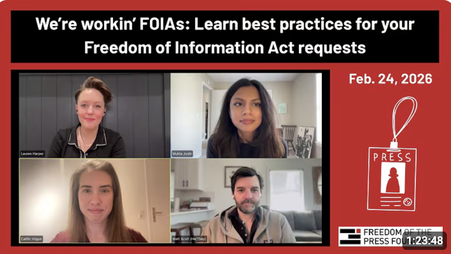We’ve long known the Justice Department’s stance on transparency has been hypocritical and disingenuous. But they’ve really outdone themselves this time. Last week, the agency secretly helped kill a bipartisan Freedom of Information Act (FOIA) reform bill that was based word-for-word on its own policy.
First, a little background: In a surprise to some, the very modest FOIA Improvements Act died in Congress last Thursday, despite virtually unanimous support in both houses. The bill was completely uncontroversial. It merely would have upgraded agencies’ ability to accept FOIAs electronically and codified existing policy—mainly President Obama’s now infamous January 20, 2009 memo in which he ordered federal agencies to operate under a “presumption of openness.”
All Speaker John Boehner had to do on the last day before Congress adjourned for the year was bring the bill up for a vote, and it would’ve been whisked through to the President’s desk. A similar bill had already passed the House unanimously earlier in the year.
Yet for some unknown reason at the time, he didn’t. On Tuesday, the Washington Post reported on the inside story behind the last-minute death of the bill, and the blame centers on the Justice Department:
According to House aides, some lawmakers balked at the legislation because several agencies, including the Justice Department, warned that those making information requests would use the “foreseeable harm” requirement as the basis for frequent lawsuits.
The “foreseeable harm” section referred to by the Post would force federal agencies to justify withholding information if they wished to do so. Essentially, they would have to show the information would cause “foreseeable harm” if released. Not exactly a tall order. But what makes the Justice Department's objection so shocking is that this “foreseeable harm” provision would not deviate at all from the Justice Department’s own policy. In fact, it was based on it.
In a March 19, 2009 memo to all federal agencies, Attorney General Eric Holder himself wrote that the Justice Department would carry out Obama’s aforementioned transparency order by rescinding the Bush DOJ’s more restrictive FOIA rules and designating new ones. From that moment on, Holder declared:
[T]he Department of Justice will defend a denial of a FOIA request only if (1) the agency reasonably foresees that disclosure would harm an interest protected by one of the statutory exemptions, or (2) disclosure is prohibited by law.
Now read full text of the provision in the just-killed FOIA reform bill that the Justice Department allegedly objected to:
An agency shall withhold information under this section only if a) the agency reasonably foresees that disclosure would harm an interest protected by an exemption described in subsection or other provision of law; or b) disclosure is prohibited by law.
As you can see, the two passages are virtually identical. How does the Justice Department think this provision will lead to more lawsuits it would have to defend if they’re not supposed to be defending those lawsuits in the first place?
The Justice Department is objecting to making its own supposed policy the law, and confirms what many have long believed: the agency does not want to—or have to—comply with its own FOIA rules.
The DOJ has repeatedly been criticized for failing to enforce, and downright ignoring its own FOIA guidance for years, and their stance on transparency in general has been incredibly hypocritical. For example, Holder has claimed he wanted the torture report to be public as soon as possible, meanwhile fighting in court to prevent the release of any documents on its own torture investigation. Likewise, he’s claimed the Justice Department supports a federal shield law so reporters can protect their sources, while at the same time destroying the already-existing reporter’s privilege in the Fourth Circuit.
But this most recent development is just beyond the pale.
We had a feeling that the Justice Department was behind the initial delay in getting the bill passed months ago after receiving a tip from a knowledgeable source. In July we filed a FOIA request for emails between the Justice Department and the offices of the FOIA bill’s co-sponsors John Cornyn and Patrick Leahy that discuss the agency’s position on the bill. We’ve been waiting six months and still have gotten no response.
Now we know why.




